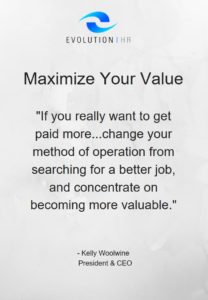If you want to get paid more, the first step is to understand what you are really selling and what employers are really buying. In the capitalist system, your labor is bought and sold every day on the open, free market. What does free market system mean? It means that the price, or value, of something is determined by what one party is willing to sell it for and another party is willing to pay for it…period. Let’s say you have a vehicle that Kelley Blue Book says is worth $17,000 and you advertise it on Craig’s list and Autotrader for months but it won’t sell. You receive several offers below that number and eventually sell it for $14,500. Guess what it’s true value and worth is? $14,500. Even something as corporate as bread or coffee. If a $3 loaf of bread doesn’t sell well, soon it will be offered for $2.75 and so on. Same with a $4 cup of coffee. Eventually those products’ prices fall or rise to a number that keeps them selling. There are exceptions, but for the most part, everything that is bought and sold in this country is done the same way. Including you.

When you offer your labor on the open market what are you really selling? What is the employer bidding on? 3 Things: Skill set, Habits and Beliefs. Skill sets are easier to define. Welding, communication, accounting, programming, etc. Most job matching revolves around finding a need for the skill sets you have. If you are a programmer and you see an ad for a programmer, match made in Heaven right? Not necessarily. If you were the only programmer in the world, yes. You’ll get the job and demand a high price. But guess what…you’re not the only programmer in the world. When your skill sets are equal to others’, what gets you the job or the higher pay? Your habits and beliefs are what will differentiate you on the open market.
Our habits and beliefs define who we are. Your friends, family, coworkers and employers know you for what you do day in and day out. This is how their perception of you is formed. If you have a habit of being late, this is how people will see you and describe you. You may be a single mom with 3 kids and always have a legitimate reason for running a few minutes behind. However, your employer will not think of you, and value you, as a single mom. They will value you like someone who has an issue with punctuality. This will lower your value with your current employer and make you vulnerable to job loss. Likewise, the track record will follow you and diminish your value on the open market.
If you have a habit of easily falling into a bad mood or a habit of complaining, while you may be an excellent programmer, your boss’s perception of how you affect the mood of the workplace may be affecting your pay. If you have a habit of focusing on the short-comings of others, easily letting circumstances overwhelm you, or letting your surroundings affect you and not putting enough focus into your own self-awareness, you may have habits that are greatly, and negatively affecting your pay.
As for beliefs, this is where many of our habits come from. If you believe for example that you should always assume the worst, then you will develop habits of thinking and doing that support this belief. Likewise, by doing this, you probably also increase the odds that the worst outcome will happen. If you believe you should assume the worst, then you probably display the body language, say the things and do the things that someone who does not usually succeed does. Employers, leaders, interviewers all know what an unsuccessful person looks and sounds like. This not what they are going to pay top dollar for.

Each January you receive a receipt for your labor. That receipt is your W-2 or 1099. Whatever number is on that receipt was your current value for that year. Many of you may be thinking, “No way! I am terribly underpaid and worth way more than that!” Are you? There was no gun to your head. Most likely you accepted the current value you received for one of two main reasons. You love what you do and it’s not about the money or, you could not find an alternative that paid more. When having this discussion people will often say things like, “Well I can’t just quit my job and walk out. I have a mortgage, kids and bills to pay!” But if you were TRULY worth more than what you are being paid, you would be a bargain quickly snatched up by the next buyer.
If an employer needs a particular talent or skill, they will pay whatever is necessary to get it. If that talent or skill is readily available, then they don’t have to pay as much for it.
If you really want to get paid more, you will change your method of operation from searching for a better job and concentrate more on becoming more valuable. Most people build their entire career path around “looking for the right opportunity.” Therefore, they are at the mercy of the market. If you want to make $100,000, you have much greater odds of getting it by focusing on skill sets, habits and beliefs that are WORTH $100,000 as opposed to looking for it. Turn your energy and focus to yourself. Your current skill sets, habits and beliefs are worth PRECISELY what you are currently being paid for them.
When all skills are equal, employers want the best habits and beliefs they can find. Three programmers apply. The one who the employer believes has the best habits and healthiest beliefs will get the job. If you want to get paid more, focus on what pays…YOUR skill sets, habits and beliefs. If you want to make $100,000, $200,000 then start focusing on learning what habits, beliefs and skill sets are worth that on the open market. Stay tuned to this series to learn more about what employers are valuing and buying. In the next several weeks I will outline this much more specifically and highlight how you can make more money.
